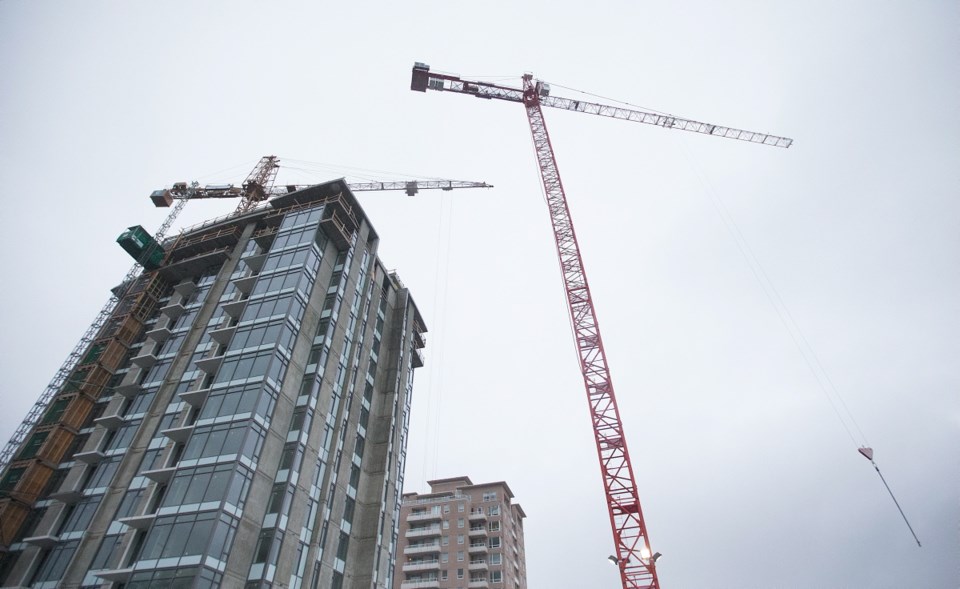The City of Victoria should rethink its proposed policy to require all new condo projects to include 10 to 15 per cent affordable units, says a city-appointed working group studying the issue.
The city likely could realize more units of affordable housing by instead accepting cash-in-lieu from developers building multi-unit projects, says the working group, comprising housing advocates, non-profit providers, community associations, developers and strata housing advocates.
The Urban Development Institute even suggests that an “inclusionary housing” policy like that being considered by the city could have the perverse effect of actually driving up prices.
The working group was struck after the development community reacted with alarm in November at a recommendation from councillors Jeremy Loveday and Ben Isitt that the city immediately start negotiating with developers to require between 10 and 15 per cent of units in all new condo projects be built as affordable rental.
Council opted for more consultation but is committed to having a new policy drafted by March 31. Staff are seeking council direction on whether to pursue cash-in-lieu options.
In an interview, Loveday said he’s not ready to give up on the idea of requiring affordable units in all new developments. “Right now. the biggest concern in our community is affordable housing so we need to make sure that we’re implementing policies that will deliver the most affordable and adequate housing that we can,” Loveday said.
“I still see the inclusionary housing strategy as one small piece of that puzzle and, yes, I’m disappointed and frustrated at how long this has taken,” Loveday said, noting that the UDI has not been a fan of the policy from the outset.
“I don’t think this is an either-or conversation,” said Coun. Laurel Collins when asked about the possibility of the policy including a cash-in-lieu option.
“I do think that pushback from some of the development community is going to be expected.
“Developers who want to build 100 per cent luxury condos aren’t going to be happy with the policies we’re putting forward but there are developers who are willing to provide affordability and to provide community amenities,” she said.
In a letter to councillors, UDI executive director Kathy Hogan said there was a consensus among the working group members that the proposed policy “would not be an effective or efficient way to achieve affordability.”
But Emily Rogers, a legal advocate with TAPS (Together Against Poverty Society), said no such consensus was reached.
“I think that there was a consensus that exploring cash-in-lieu was acceptable. I do not think there was a consensus that that was a direction that the working group as a whole wanted to take.”
In her letter Hogan suggested there are several reasons why the proposed policy won’t meet affordability objectives, including:
• If a developer is required to provide affordable units within each project, it eliminates the ability to leverage further funds from B.C. Housing or the federal government.
• If all amenity contributions are going to create affordable units it leaves no money for the likes of heritage restoration, public art, parks or other neighbourhood improvements.
• It produces units that are difficult to manage by non-profits as the units are scattered around the city.
• It creates complexity in managing the strata itself, as having multiple units owned by a single entity (a non-profit) could create a voting imbalance.
• It could increase the price of new market-priced strata housing as the costs of affordable units are recovered through the sale of market units.
• The policy is based on market assumptions in a consultant’s report that have not been proven.
• The policy is “all stick and no carrot” and provides no incentives for a developer to provide affordable units.
The UDI recommends the city use amenity contributions to buy land and partner with senior governments to build affordable units.
In July 2017, the previous council gave direction to staff to prepare an inclusionary housing policy but in September postponed its consideration pending consultation with stakeholders.
Following October’s municipal election, Isitt and Loveday recommended that that policy be resurrected and used as the foundation for negotiations with developers wanting to build in Victoria.



